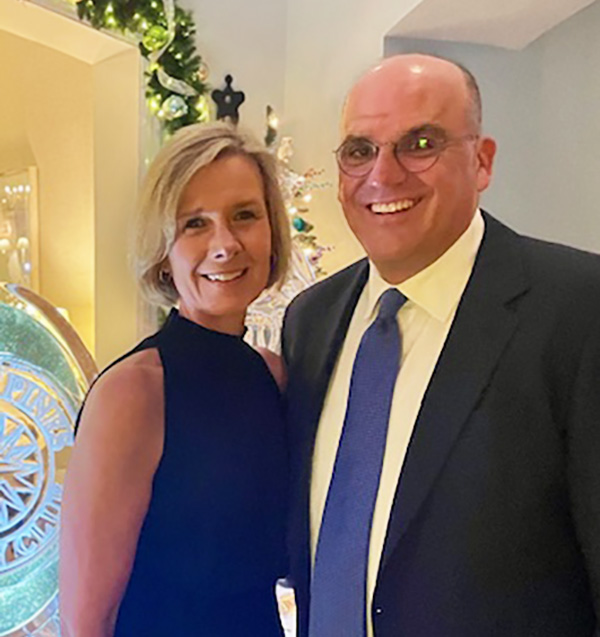Helping to Transform the Treatment of Neurodegeneration

California residents David and Kim Sewell had a big decision to make in 2007: David had a fantastic career opportunity but it meant relocating to Cleveland.
David had had some serious health challenges at a young age, so good healthcare was important — and Cleveland Clinic became the deciding factor for them. “We became very dedicated to the purpose of Cleveland Clinic and grateful for everything they do for the community and their patients. In California, I had great care but when you see how well the Clinic operates and how well they took care of all my health needs, it was something that really blew us away. We are so fortunate to have something this wonderful here in Cleveland,” says David. Today, the former Sherwin Williams executive and his wife are longtime supporters of Cleveland Clinic and David serves on the Board of Trustees.
The Sewells are most impressed with Cleveland Clinic’s focused approach to treating complex issues. “The way the specialists work as a team to solve problems is unique,” says David. “From the phlebotomist to the nurses, to the medical assistants — the idea of ‘patients come first’ is something we’ve seen up close and personal many times.”
But nothing prepared the Sewells for the difficulties that arose when Kim’s mother began having cognitive issues a few years ago.
Behavioral Changes Lead to Worry
“My mom began having some comprehension and cognitive impairment, and we weren't sure what was going on with her,” explains Kim. “She was developing some anxiety and depression, and having trouble with executive functioning. And this was all exacerbated by a relocation from Portland, Oregon to Naples, Florida.”
Kim’s parents were excited about relocating to Florida because they’d be closer to Cleveland. But the move to Naples took her mother out of her routine and, as Kim describes it, the wheels fell off. “Even though she wanted to do the move, it really allowed us to see what was going on with her,” says Kim.
A new home also meant a new healthcare system and new doctors for Kim’s parents. For a year and a half, they all tried to figure out a diagnosis but were hampered by the complicated situation — were the behavioral changes related to the move? Was it situational depression? What was going on?
Finally, a Diagnosis
In the spring of 2019, Kim’s parents came to Cleveland to attend their granddaughter’s high school graduation ceremony. Kim recalls two emergency room visits to Cleveland Clinic and then a hospital stay. A geriatric physician along with psychiatrists, internists and neurologists worked as a team to determine the accurate diagnosis: frontal temporal dementia. “She presented differently than most people and was able to hide it for a long time,” says Kim.
Following the recommendation of the geriatrician, Kim’s parents stayed in Cleveland for the next five months while her mother underwent comprehensive examinations and extensive testing at Cleveland Clinic to precisely determine the extent of the dementia and its impact on her cognition.
The Cleveland Clinic Brain Study
In 2022, Cleveland Clinic launched a landmark study to better understand the mechanisms of neurological diseases, with the goal of pinpointing disease biomarkers early, well before clinical symptoms manifest.
The Cleveland Clinic Brain Study — the largest clinical study ever for brain disease — is collecting data from up to 200,000 neurologically healthy individuals over a 20-year period to identify brain disease biomarkers and targets for preventing and curing neurological disorders.
“Disrupting neurological diseases is one of the greatest challenges of our time and motivates our clinicians and scientists every day,” says Andre Machado, MD, PhD, one of the study’s three co-principal investigators and Chair of Cleveland Clinic’s Neurological Institute. “By launching a study of this magnitude, we have the potential to discover causes of neurological disorders and what happens before symptoms become obvious — the silent phase. Our hope is to change the course of neurodegeneration, with the long-term goal of curing diseases in their earliest stages, years before symptoms are even seen. We can make neurological care better for the next generations.”
Grateful For the Opportunity
Kim and David were immediately intrigued when they learned about the Brain Study. “I think the whole idea of trying to figure out why some brains age the way they do and why some don't, being proactive with preventive measures and helping people live a better quality of life after a diagnosis really spoke to our interests,” says Kim.
David points out how difficult it was to watch his mother-in-law’s health decline. “This vibrant, brilliant woman just deteriorated so quickly; it's such a horrible disease,” he says. “And as we’ve learned while going through it, so much is unknown about brain health.”
Inspired by their personal experience, the Sewells made a generous investment in the Brain Study. “We've prioritized Cleveland Clinic in our philanthropy because we think it's so important,” says David. “I just really believe in Dr. Machado and everything he and the team are doing. We want to support it any way we can, and we'll continue to do that for the rest of our lives. We're very grateful for the opportunity to give.”
Kim’s mother now lives in a memory-care facility in Naples, and her father lives in the home they purchased there. “It's hard,” Kim admits readily. “As my parents age, it's hard to figure out what's going on with them, especially when there's some cognitive impairment because there are so many things that it could be. It’s exciting for us to support Cleveland Clinic research that will make people's lives better right now — and also in the future.”
How You Can Help
Philanthropy is the most powerful catalyst for moving ideas to innovations to outcomes. The Brain Health study is entirely funded by philanthropic contributions, with gifts of all sizes pooled to support the research. Your gift to support the Brain Health study is appreciated.

